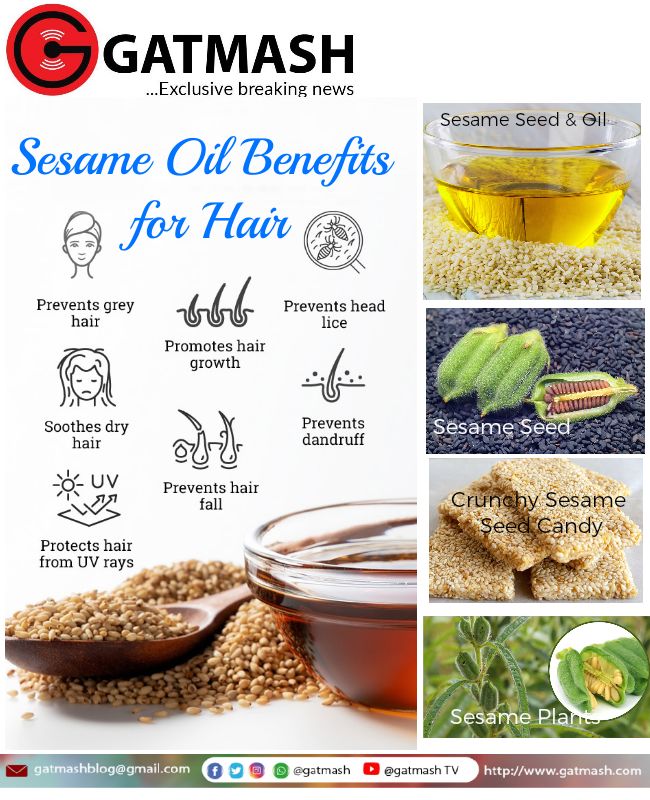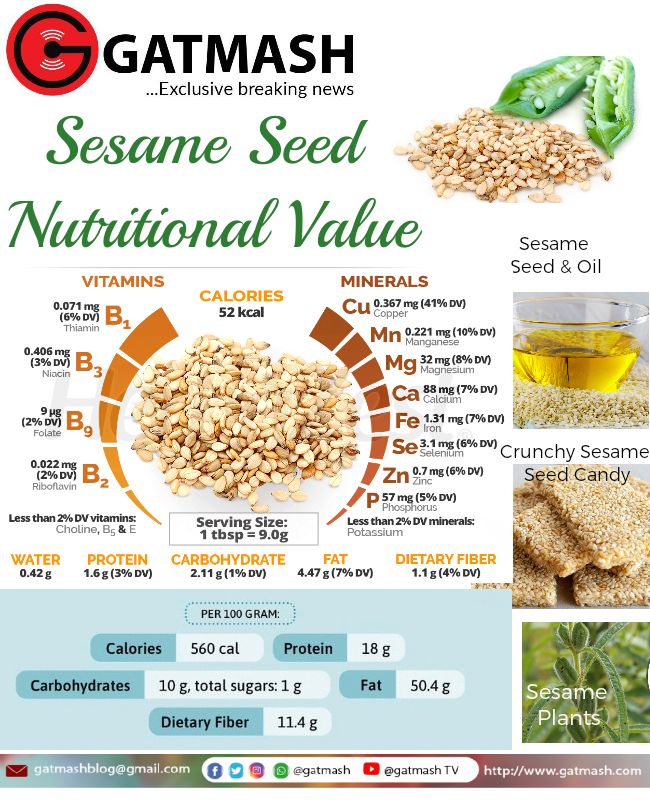
Continued from last week…
Sesame seeds are packed with vitamins, nutrients and minerals that are vital for the maintenance of a healthy scalp and hair. Just like the skin, sesame seed oil has beneficial effects on your scalp, thus combating various scalp problems. It’s essential to know that sesame seeds/oil facilitates hair growth and skin care.
Zinc is a crucial component in the formation of collagen, a compound that strengthens and vitalizes skin, hair, and muscle tissue. What better way to incorporate zinc in your diet than to eat a zinc-rich food like sesame seeds. In fact, the effects of zinc in sesame seeds are so acute that it has been known to reduce the appearance of marks such as burns, on the skin. It also keeps the skin looking young and fresh, and prevents premature signs of aging showing on visible parts of the body, such as the face. Black sesame seeds used for grey hair problem and white sesame seeds can be used for hair regrowth and prevent hair fall loss.
- Encourage Hair Growth
Sesame seeds contain essential fatty acids such as omega-3, omega-6 and omega-9 which promote hair growth. Sesame seed oil stimulates hair growth by nourishing, conditioning, and promoting a healthy scalp. The regular massage with warm sesame oil penetrates your scalp, thus increasing the blood circulation. It is comparable to a liquid vitamin that feeds your hair roots and shafts.


- Prevention of Scalp Problems
Sesame seeds are rich in replenishing vitamins, minerals and nutrients that are vital for a healthy scalp. Massaging your scalp with sesame seed oil combats dryness, flakiness and clogged pores that cause hair thinning and hair loss. Besides, its antifungal, antibacterial and anti-inflammatory properties help in treating scalp infections and dandruff and soothing an irritated scalp.
Add two teaspoons of sesame oil to 2-3 drops of rosemary essential oil and one tablespoon of aloe vera gel. Apply this mixture on your scalp and massage gently with circular motions for twice or thrice a week and rinse your hair with a chemical-free shampoo and conditioner.
- Natural Sunscreen
Sesame seed oil acts as a natural sunscreen for your hair by protecting it from the damaging effects of the sun’s ultra-violet rays and pollution.
- Deep Conditioning
Sesame seed oil acts as a deep conditioning treatment for dry, damaged hair, split ends or chemically treated hair. It restores the lost moisture and strengthens the hair shaft, enabling dull and brittle hair to regain its shine, bounce, elasticity and softness.
- Hair Darkening Qualities
Sesame seed oil is known for its hair darkening qualities that make it effective for people suffering from premature graying of hair. It can be used with carrier oils like olive or almond oil to reap the maximum benefits.

Sesame Seeds Nutrition Facts
All varieties of sesame seeds are extremely nutritious. They have a high oil content of 40% to 60%. They are a rich source of minerals like copper and manganese. They also contain magnesium, calcium, phosphorus, iron, selenium, vitamin B1 and zinc, and are rich in dietary fiber and monounsaturated fats. The nutritional value of sesame seeds is explained below.
| S/N | Nutrients | Nutritional Value |
| 1. | Calories | An ounce of raw, dried sesame seeds contains around 163 calories and 14.11 grams of fats, including 1.96 grams saturated fats. Roasted sesame seeds, on the other hand, contain 160 calories and 13.61 grams of fats, including 1.09 grams saturated fats. Both raw and roasted sesame seeds are cholesterol free. |
| 2. | Protein | Sesame seeds are a great vegetarian source of protein. An ounce of raw, dry sesame seeds contain 5.03 grams of protein, whereas the roasted ones contain 4.81 grams. However, one cannot solely rely on sesame seeds as a source of protein as the actual amount of protein derived is far less. |
| 3. | Vitamins | Both raw and roasted sesame seeds are devoid of vitamins A, C, D, E or K. An ounce of raw or roasted sesame seeds contains 0.22 mg of thiamin, which is 19% of the daily value and 0.07 mg of riboflavin, which is equivalent to 6% of the daily value for adults. |
| 4. | Minerals | An ounce of dried sesame seeds provides 291 mg of calcium, 4.113 mg of iron and 9.77 mg selenium, satisfying 29.1% of the daily value of calcium and 18 % of the daily value of selenium for adults. It also satisfies 23% and more than 50% of the recommended daily value of iron for women and men respectively. Roasted sesame seeds have a comparatively lower mineral content than their raw counterparts. |
Hope now you are clear with its benefits and how to eat sesame seeds. Sesame seeds are packed full of essential nutrients. Try and include them in your diet and you will see the benefits. You can try and use sesame oil as a cooking base as well.


How to Select and Store
Sesame seeds are generally available in pre-packaged containers as well as bulk bins. Just as with any other food that you can purchase in the bulk section, make sure that the bins containing the sesame seeds are covered and that the store has a good product turnover to ensure maximal freshness. Whether purchasing sesame seeds in bulk or in a packaged container, make sure there is no evidence of moisture. Additionally, since they have high oil content and can become rancid, smell those in bulk bins to ensure that they smell fresh. Unhulled sesame seeds can be stored in an airtight container in a cool, dry, dark place. Once the seeds are hulled, they are more prone to rancidity, so they should then be stored in the refrigerator or freezer.
Adding Sesame seed to Your Diet
I’ve talked about where sesame seeds come from, the best sesame seeds benefits and here’s how we can include it in our daily diet. No thought sesame seeds can give a nutty flavor and subtle crunch to many dishes. To enhance the flavor and nutrient availability of sesame seeds, roast them at 350℉ (180℃) for a few minutes, stirring periodically, until they reach a light, golden brown. Try adding sesame seeds to: stir-fries, hot or cold cereal, bread and muffins, crackers, yogurt, smoothies, salads, salad dressing, garnishes. Additionally, you can use sesame seed butter — in place of peanut butter. Ground sesame seeds — called sesame flour or sesame seed meal — can be used in baking, smoothies, fish batter, and more.
How to Enjoy Sesame Seeds
Sesame seeds have long been used for medicinal purposes because of its vast nutritional benefits, and whether used in the production of vegetable oil or other ways it still contains those amazing nutrients that are beneficial to health. Culinary, sesame is used to add taste to some recipes due to its nutty and mild flavour. Sesame seeds add a nutty taste and a delicate, almost invisible; add a lovely crunch to many dishes. The aroma and taste are mild and nutlike and the seeds are high in protein and are rich in thiamin and vitamin B6.
Apart from its use in the production of edible vegetable oil, which is high demand because of the nutritional and health benefits it possesses can also serve as a substitute for egusi and use in the preparation of what is called Esa soup in Nigeria, though both egusi and sesame seed looks alike in every aspect, their sizes are likely what differentiates them mostly and also beni seed is said to have more oil than egusi too. Add sesame seeds into the batter the next time you make home-made bread, muffins or cookies. Combine toasted sesame seeds with soy sauce and crushed ginger, garlic (especially the garlic lovers) and use as a dressing for salads, vegetables and noodles.
Sesame seeds can be eaten raw. Whether eaten in raw form, cooked or used as ingredients provide a lot of health benefits which have been explained above. Eating these seeds raw can be bitter in taste but still healthy. Sesame can be taken alone or combined with other nutritious seeds or nuts to gain the same health benefits.
Following the nutritional values which can be gotten from grams of sesame per serving, one can be able to know the quantity that can be okay for a day. Taking 50 grams of sesame seeds per day won’t be bad as a good source of healthy fat contained in the diet.
Sesame seed though beneficial to human health can have a side effect when taken in excess just as other healthy seeds. An allergic reaction such as anaphylaxis is applicable to sesame seeds oil when abused.

Side-Effects
Like everything else, sesame seeds should also be consumed in moderation. Excessive consumption can cause bowel and colon irritation, which is in fact the opposite of what sesame seeds are ideally supposed to do for the human body.
The Bottom Line
Sesame possesses beneficial nutrients and is rich in many minerals and vitamins which include selenium, calcium, phosphorus, zinc, copper, dietary fiber, protein, molybdenum, folate, magnesium, iron, manganese, vitamin B1 and B6. These nutrients have several benefits that they add to human health through the consumption of sesame seeds.
Sesame seeds help to the moderate the level of cholesterol in the body, good for heart health, prevent diabetes, helps in asthma treatment, prevent anemia and other blood diseases, reduces constipation, helps in maintaining strong bones, nourish the skin, good for eye health, helps in detoxification of the liver, good for pregnant women, good for oral health, protect the organs from radiation effects, serves as a weight-loss diet and balances sex hormone.
Sesame seeds are a good source of healthy fats, protein, B vitamins, minerals, fiber, antioxidants and other beneficial plant compounds. Regularly eating substantial portions of these seeds — not just an occasional sprinkling on a burger bun — may aid blood sugar control, combat arthritis pain, and lower cholesterol. To optimize your nutrient intake, you can eat sesame seeds soaked, roasted, or sprouted.
No wonder, the popular adage comes to our mind – big things come in small packages. Stay fit, stay healthy!
Don’t forget to like and follow me on all social media platforms.
Share your experience, suggestions, etc with us in the comment section or via email. Don’t forget to like and follow me on all social media platforms.
Theresa Moses
Journalist <> Blogger <> Publishing <> Brand Consultants <> Film/Documentary Production
Phone: +234-807-202-2024; E-mail: [email protected]; Instagram: evertess2010; LinkedIn: Theresa Moses; Twitter: @moses_theresa; Facebook: Theresa Moses





